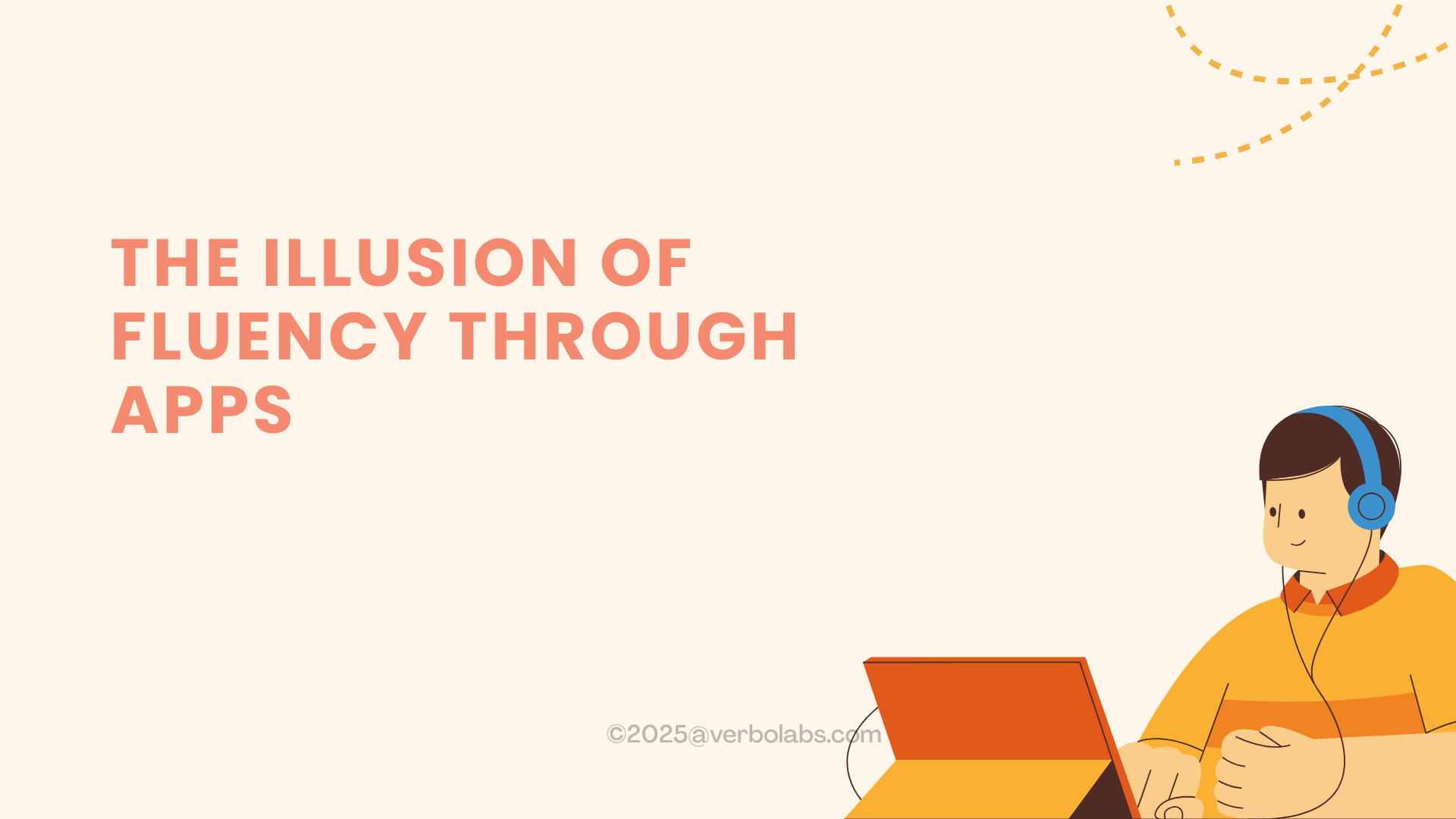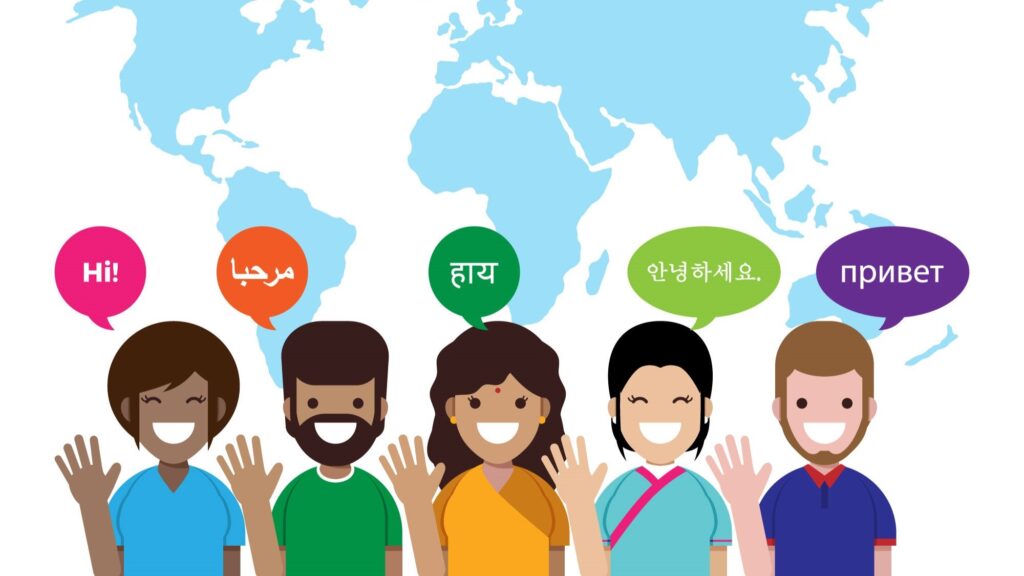
In the digital age, learning a new language has never been more accessible. From AI-powered apps to YouTube tutorials and chatbots, technology has undoubtedly transformed the language learning landscape. But does relying solely on digital tools lead to true language mastery?
Short answer: No.
While apps and platforms provide convenience, structure, and gamified learning, they often fall short of offering the cultural, emotional, and contextual richness that language acquisition demands. In this blog, we’ll explore why learning a language only using technology can limit your growth—and how a hybrid approach, combining tech with professional human support (like VerboLabs’ expert language services), can be the real game changer.
The Illusion of Fluency Through Apps

Language learning apps like Duolingo, Babbel, and Rosetta Stone have grown massively—Duolingo alone had over 83 million monthly users in 2023. While these platforms are helpful for beginners, most users don’t progress beyond basic phrases or vocabulary. According to a study by Michigan State University, only 25% of language learners using apps alone reach an intermediate level after 6 months of consistent usage.
Why?
Because apps teach patterns, not real-life context. They rarely simulate organic conversations, cultural expressions, regional slang, or dialect variations. You may learn how to say “I am eating an apple” in Spanish—but freeze during an actual conversation with a native speaker.
Motivation Fades Without Human Connection
One of the most under-discussed challenges in digital learning is motivation and accountability. Algorithms can track your streaks, but they don’t adapt to your emotions, learning frustrations, or personal learning curve.
A 2022 report by The Language Flagship found that over 60% of online-only language learners quit within the first 3 months, citing boredom, lack of human interaction, and difficulty staying consistent.
Fact: Language acquisition is not just cognitive—it’s emotional and social. You learn better when interacting with real people, receiving feedback, and having culturally immersive conversations.
Language Is Culture—Not Just Vocabulary
You can memorize thousands of words with flashcards or apps and still be clueless in a real conversation.
Languages are deeply rooted in culture, history, gesture, tone, and even humor. These subtleties are almost impossible to grasp through tech platforms alone. Take the example of Japanese—formal and informal speech, honorifics, and even pauses play a crucial role. No app teaches that nuance accurately.
That’s where professional human translators, native speakers, and cultural consultants—like those at VerboLabs—step in to make learning or adapting a language truly effective.
The Risk of Poor Pronunciation and Accent
Voice recognition in language apps often fails to detect subtle mispronunciations or incorrect accents. This can lead to users unknowingly reinforcing wrong pronunciation habits—which are much harder to fix later.
On the contrary, trained language professionals can identify and correct these issues early, making your accent more natural and intelligible. This is especially important for professionals preparing for global careers, overseas studies, or international business.
Lack of Learning Depth: The “Fast Food” Problem
Most language apps provide quick lessons—usually 5 to 15 minutes daily. While this works as a supplement, it promotes shallow learning. Learners often memorize without understanding grammar structures, sentence formation logic, or contextual usage.
A 2021 survey by The British Council highlighted that only 18% of self-taught language learners felt confident writing formal emails or giving presentations in the language they were learning through technology.
Regional Language Barriers: Tech Can’t Cover It All
Learning mainstream languages like Spanish or French via apps is relatively easier, but what about learning less commonly taught languages like Estonian, Marathi, or Swahili?
Most apps don’t offer comprehensive modules or certified instruction in regional languages. This limits learners, especially professionals or institutions looking to expand into diverse local markets.
VerboLabs addresses this gap through human-powered language solutions across 120+ global and regional languages. Whether you’re learning Hindi for business or Swahili for NGO work, VerboLabs provides customized training, translation Services , localization, and even voiceover solutions tailored to your real-world needs.
The Overlooked Value of Paper and Personalization
Scrolling through screens is convenient, but paper-based learning supports better memory retention. Studies show that learners who use handwritten notes and printed materials demonstrate 20–30% better recall compared to those who rely entirely on screens.
Also, language is random. Online lessons are linear—you click on sections and follow structured paths. But real-life language is unpredictable. Printed materials, notebooks, and one-on-one human coaching allow for more exploration, randomness, and organic learning.
Why a Hybrid Learning Model Works Best
Technology isn’t the enemy—it’s a tool. When paired with expert human guidance, it becomes a powerful language learning accelerator.
That’s why businesses, academic institutions, and even governments now adopt hybrid models—leveraging both AI tools and human expertise.
Enter VerboLabs
VerboLabs is India’s leading language service provider, offering:
- Language training services for corporates and professionals
- Human translation and localization solutions for 120+ languages
- Voiceover and dubbing services for e-learning, OTT, and media
- Certified document translation and interpretation support
We bridge the gap between technology and culture, ensuring that you don’t just learn a language—you master it, live it, and thrive with it.
Whether you’re a student, entrepreneur, or global enterprise, VerboLabs helps you build linguistic fluency with cultural depth.
Final Thoughts: Learn Smart, Not Just Fast
While learning a language through technology might seem efficient and convenient, it often leads to superficial understanding and limited real-world application. True language fluency requires more than just vocabulary drills and gamified lessons—it demands cultural context, emotional engagement, and human interaction. Without real feedback, personalization, and exposure to diverse resources, learners miss out on the richness and depth that language acquisition truly involves.
To build lasting fluency and confidence, it’s essential to go beyond screens and integrate technology with human expertise. By blending digital tools with professional guidance—like the language services offered by VerboLabs—you not only learn faster but also smarter, gaining the skills to use language effectively in real-life situations.

Ready to go beyond apps and truly master a new language? Get expert, human-led training and translation support with VerboLabs.



